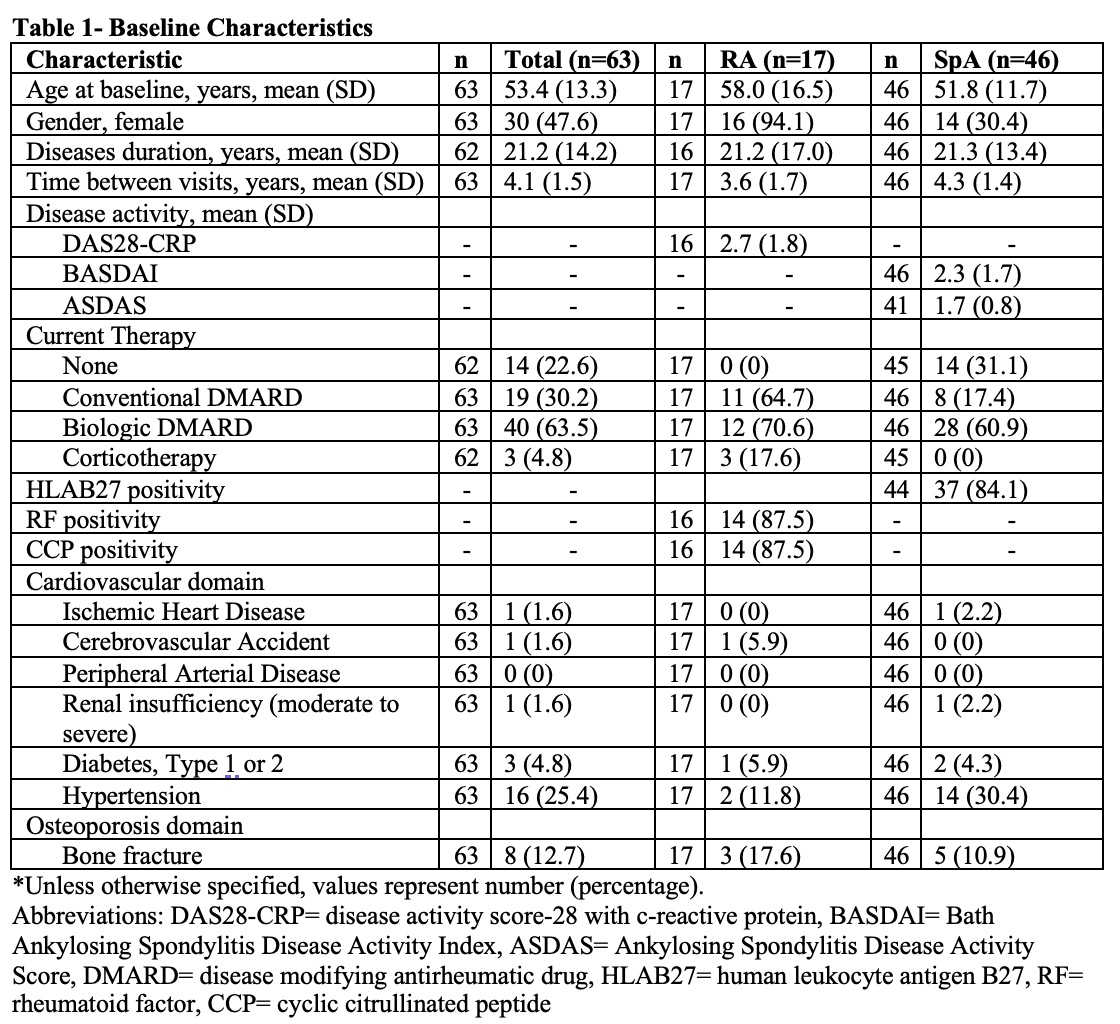Session Information
Date: Sunday, October 26, 2025
Title: (0210–0232) Measures & Measurement of Healthcare Quality Poster I
Session Type: Poster Session A
Session Time: 10:30AM-12:30PM
Background/Purpose: Patients with inflammatory arthritis (IA), including rheumatoid arthritis (RA) and spondyloarthritis (SpA), face elevated risk for comorbidities that complicate disease management. Although rheumatology societies recommend periodic comorbidity reviews, few studies have assessed the effectiveness of this resource- and time-intensive intervention. This study aimed to assess the impact of a structured global review on comorbidity management in patients with IA.
Methods: We conducted a retrospective cohort study of adult patients with RA or SpA who completed two global reviews at Hôpital Cochin, Paris, between June 2017 and March 2025. The global review followed a standardized protocol aligned with EULAR recommendations for comorbidity management in rheumatic diseases, assessing cardiovascular, bone, infection, and malignancy risk (1). For cardiovascular and malignancy domains, recommendations were provided to the general practitioner, while specific prescriptions were issued when vaccination or bone health interventions were indicated.Baseline characteristics were determined using simple statistics. Comorbidity management at the second review was compared to the first using McNemar’s test for categorical variables and Wilcoxon signed-rank test for continuous non-normally distributed data.
Results: The cohort included 63 patients (RA: 17, SpA: 46) with a mean disease duration of 21.2 years (SD 14.2), and mean time between visits of 4.1 years (SD 1.5). Among RA patients, 94.1% were female, mean age 58.0 years (SD 16.5), mean DAS28 2.7 (SD 1.8). Among SpA patients, 30.4% were female, mean age 51.8 years (SD 11.7), and mean ASDAS 1.7 (SD 0.8). Corticosteroids use was low (4.8%), while 63.5% of patients received biologics.Despite 52.7% of patients having elevated LDL, 26.7% being hypertensive, and 43.5% being overweight at baseline, no significant improvement was seen in cardiovascular risk management at follow-up. In contrast, with respect to bone health, there was a significant improvement in rates of vitamin D deficiency from 81.5 to 43.1% (p< 0.001). Vaccination adherence improved: influenza coverage increased from 40.7% to 66.1% (p=0.004), and DTP from 57.4% to 73.0% (p=0.037). Compliance with skin cancer screening rose from 45.2% to 58.7% (p=0.043). Adherence to mammography and Pap smear guidelines remained high ( >80%) at both time points, suggesting a ceiling effect. No change was observed in colorectal cancer screening rates.
Conclusion: A single structured global review led to meaningful improvements in vaccination coverage, vitamin D deficiency correction, and skin cancer screening among IA patients. However, cardiovascular risk management did not improve, potentially due to the absence of direct prescriptions. These findings support the utility of global reviews while highlighting the need for better coordination in managing complex comorbidities in patients with IA.Reference: 1. Baillet A, et al. Points to consider for reporting, screening for and preventing selected comorbidities in chronic inflammatory rheumatic diseases in daily practice: a EULAR initiative. Annals of the rheumatic diseases. 2016 Jun 1;75(6):965-73.
To cite this abstract in AMA style:
Kobza A, Bourgeois C, Fogel O, Dougados M, Molto A. Impact of Global Review on Comorbidity Management in Inflammatory Arthritis Patients [abstract]. Arthritis Rheumatol. 2025; 77 (suppl 9). https://acrabstracts.org/abstract/impact-of-global-review-on-comorbidity-management-in-inflammatory-arthritis-patients/. Accessed .« Back to ACR Convergence 2025
ACR Meeting Abstracts - https://acrabstracts.org/abstract/impact-of-global-review-on-comorbidity-management-in-inflammatory-arthritis-patients/


.jpg)